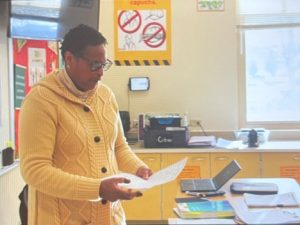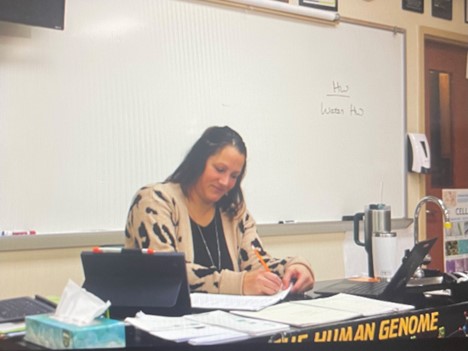What makes a good teacher? This question is often asked by both students and teachers alike, who seek to understand the world of learning. Although answers vary, a teacher must have several key qualities. Here at Good Counsel, our teachers embody these qualities.
At Good Counsel, teachers frequently demonstrate their superb preparedness in their creative lesson planning, time management, and engaging course loads. From a student’s point of view, creative lesson planning lightens the stress on students and creates an enjoyable environment. “A good teacher respects a student’s time and doesn’t make

school work seem like a burden to them. I believe that a teacher’s responsibility is to make school an enjoyable environment for their students,” Adrian Patiag ‘27. Effective time management allows students and teachers to receive feedback and complete grading promptly. Additionally, creative teachers excel at making each lesson interesting, while creating engaging coursework that benefits students. Exceptional preparedness can improve a teacher’s lessons by gathering data from students to determine what may work and does not work. Teachers at Good Counsel and beyond demonstrate high levels of preparedness to provide students with a quality level of education.
A critical quality of teaching stems from the teacher’s knowledge of their subject and is directly related to successful preparation. Intimate knowledge of a teacher’s chosen subject allows them to expand beyond the curriculum’s guidelines. In addition, the additional knowledge a teacher provides about a subject could encourage students to pursue a career in an academic field that students enjoy learning about.
Communication, a key quality of good teaching, consists of speaking, writing, active listening, and patience to repeat frequently both verbally at school and electronically through emails. Patience in particular is needed in situations

when teachers should maintain their composure with their students. Patience benefits teachers as they can better understand the issue at hand and students so they feel better understood. “Even if they [the teachers] do not want to, they can try their best to be patient with the kids [(students)],” – Mathew Greene ‘27. Also, communication between teachers is important as experience can be shared which can improve one’s teaching ability: “Experience is most important for improvement; collaboration with veteran and novice teachers: attend conferences that are relevant.” – Ms. Haight, Science Department Chair. In addition, here at Good Counsel, our Flex periods are perfect for personal communication between students and teachers.

Lifelong learning can be regarded as an important quality to possess as a willingness to continue one’s education is extremely beneficial, especially for teachers. According to Senora. Herndon-Cintron, a Spanish teacher at Good Counsel, ”Teachers can take courses to learn how to connect and support diverse learners, continue to study their discipline, participate in diversity and justice initiatives, and take technology courses to enhance instruction”. Teachers who enjoy learning maintain their passion for their subject while pursuing both formal and informal studies in their area of expertise. In addition, frequent learning for teachers grows their adaptability to new situations like new environments, students, and student backgrounds.

These are just some of the qualities that make a good teacher. Senora Herndon-Cintron summarizes her thoughts on qualities that make a good teacher; “One who is compassionate, patient, empathetic, thoughtful, humble, sincere, approachable, accepting of students no matter their background or culture, and one who likes what they do”.


